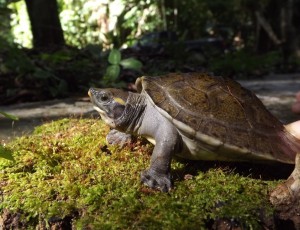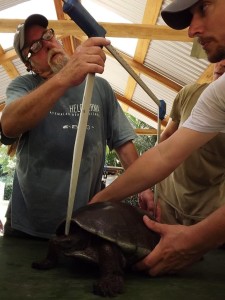Hicatee Hatchlings – Three months old & Growing!!

At 7 weeks, this Hicatee hatchling has lost its egg tooth, the carapace is flattening, and its spots are fading.
The seven Hicatee hatchlings (Dermatemys mawii) born to the HCRC in June 2015 are extremely healthy and growing rapidly. In just three short months each has more than doubled their size and weight.
During this period, Thomas Pop, HCRC Manager, has been conducting feeding trials to determine preferred diet and activity periods. Food items offered have included leaves and grasses – wild fig leaf, cecropia leaf, Paspalum grass, banana leaf, bri bri leaf, mango leaf, mangrove leaf and fruits – fig, mango, hogplum, and papaya. Most items are taken by the tiny turtles with fervor. Additionally, fish was attempted on one occasion but the hatchlings showed no interest. We will continue to offer new food items in the coming weeks and months, focused exclusively on native wild plants found in natural Hicatee habitat. Feeding occurs most intensely at night although they also eat during the day.
The hatchlings have been housed in clear plastic tubs with screened-locking lids during their first months. They will be moved to a larger, custom-built, and more permanent enclosure in the coming weeks.
Recent health exams of the adults including ultrasounds implemented by Dr. Shane Boylan, DVM, showed that at least one female is with follicles, verifying reproductive activity. Hopefully, additional clutches will be arriving in the near future. Stay tuned!



Leave a Reply
Want to join the discussion?Feel free to contribute!